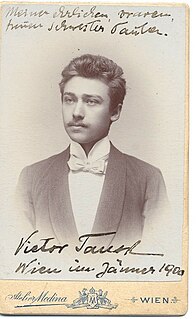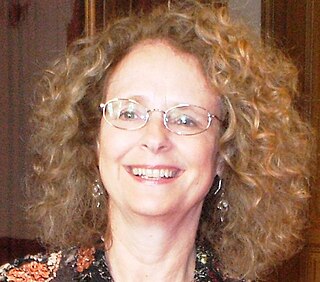Psychoanalysis is a set of theories and therapeutic techniques that deal in part with the unconscious mind, and which together form a method of treatment for mental disorders. The discipline was established in the early 1890s by Austrian neurologist Sigmund Freud, who developed the practice from his theoretical model of personality organization and development, psychoanalytic theory. Freud's work stems partly from the clinical work of Josef Breuer and others. Psychoanalysis was later developed in different directions, mostly by students of Freud, such as Alfred Adler and his collaborator, Carl Gustav Jung, as well as by neo-Freudian thinkers, such as Erich Fromm, Karen Horney, and Harry Stack Sullivan.

Theodor Reik was a psychoanalyst who trained as one of Freud's first students in Vienna, Austria, and was a pioneer of lay analysis in the United States.

Victor Tausk was a pioneer psychoanalyst and neurologist. A student and a colleague of Sigmund Freud, he was the earliest exponent of psychoanalytical concepts with regard to clinical psychosis and the personality of the artist.

Karl Abraham was an influential German psychoanalyst, and a collaborator of Sigmund Freud, who called him his 'best pupil'.
Richard A. Isay was an American psychiatrist, psychoanalyst, author and gay activist. He was a professor of psychiatry at Weill Cornell Medical College and a faculty member of the Columbia University Center for Psychoanalytic Training and Research. Isay is considered a pioneer who changed the way that psychoanalysts view homosexuality.
Girindrasekhar Bose was an early 20th-century Indian psychoanalyst, the first president (1922–1953) of the Indian Psychoanalytic Society. Bose carried on a twenty-year dialogue with Sigmund Freud. Known for disputing the specifics of Freud's Oedipal theory, he has been pointed to by some as an early example of non-Western contestations of Western methodologies. Apart from this, he also started the first general hospital psychiatry unit (GHPU) in Asia at the R.G. Kar Medical College, Calcutta in 1933.
Ernst Kris was an Austrian psychoanalyst and art historian.

Jessica Benjamin is a psychoanalyst known for her contributions to psychoanalysis and social thought. She is currently a practicing psychoanalyst in New York City where she is on the faculty of the New York University Postdoctoral Psychology Program in Psychoanalysis and Psychotherapy, and the Stephen Mitchell Center for Relational Studies. Jessica Benjamin is one of the original contributors to the fields of relational psychoanalysis, theories of intersubjectivity, and gender studies and feminism as it relates to psychoanalysis and society. She is known for her ideas about recognition in both human development and the sociopolitical arena.
Hans Loewald (1906–1993) was a German-American psychoanalyst and theorist. While apparently a traditional Freudian, Loewald in his thinking is both elegant and quietly revisionist - a radical conservatist.
The term psychic apparatus denotes a central, theoretic construct of Freudian metapsychology, wherein an implicit intake and processing of information takes place, and thereby acts on said information in pursuit of pleasure by way of resolving tension through the reactional discharge of “instinctual impulses”.
Mark Solms is a South African psychoanalyst and neuropsychologist, who is known for his discovery of the brain mechanisms of dreaming and his use of psychoanalytic methods in contemporary neuroscience. He holds the Chair of Neuropsychology at the University of Cape Town and Groote Schuur Hospital and is the President of the South African Psychoanalytical Association. He is also Research Chair of the International Psychoanalytical Association.
Peter J. Loewenberg is a teacher of “European cultural, intellectual, German, Austrian and Swiss history. Political Psychology, integrating the identities of an historian and political psychologist with the clinical practice of psychoanalysis” at UCLA.

The Foundations of Psychoanalysis: A Philosophical Critique is a 1984 book by the philosopher Adolf Grünbaum, in which the author offers a philosophical critique of the work of Sigmund Freud, the founder of psychoanalysis. The book was first published in the United States by the University of California Press. Grünbaum evaluates the status of psychoanalysis as a natural science, criticizes the method of free association and Freud's theory of dreams, and discusses the psychoanalytic theory of paranoia. He argues that Freud, in his efforts to defend psychoanalysis as a method of clinical investigation, employed an argument that Grünbaum refers to as the "Tally Argument"; according to Grünbaum, it rests on the premises that only psychoanalysis can provide patients with correct insight into the unconscious pathogens of their psychoneuroses and that such insight is necessary for successful treatment of neurotic patients. Grünbaum argues that the argument suffers from major problems. Grünbaum also criticizes the views of psychoanalysis put forward by other philosophers, including the hermeneutic interpretations propounded by Jürgen Habermas and Paul Ricœur, as well as Karl Popper's position that psychoanalytic propositions cannot be disconfirmed and that psychoanalysis is therefore a pseudoscience.

Freud and Philosophy: An Essay on Interpretation is a 1965 book about Sigmund Freud, the founder of psychoanalysis, written by the French philosopher Paul Ricœur. In Freud and Philosophy, Ricœur interprets Freud's work in terms of hermeneutics, a theory that governs the interpretation of a particular text, and discus phenomenology, a school of philosophy founded by Edmund Husserl. Ricœur addresses questions such as the nature of interpretation in psychoanalysis, the understanding of human nature and the relationship between Freud's interpretation of culture amongst other interpretations. The book was first published in France by Éditions du Seuil, and in the United States by Yale University Press.
Deborah P. Britzman is a professor and a practicing psychoanalyst at York University. Britzman's research connects psychoanalysis with contemporary pedagogy, teacher education, social inequality, problems of intolerance and historical crisis.
Joseph J. Sandler was a British psychoanalyst within the Anna Freud Grouping – now the Contemporary Freudians – of the British Psychoanalytical Society; and is perhaps best known for what has been called his 'silent revolution' in re-aligning the concepts of the object relations school within the framework of ego psychology.
The Psychoanalytic Quarterly is a quarterly academic journal of psychoanalysis established in 1932 and, since 2018, published by Taylor and Francis. The journal describes itself as "the oldest free-standing psychoanalytic journal in America". The current editor-in-chief is Jay Greenberg.

Henry Zvi Lothane, M.D., is a Polish-born American psychiatrist, psychoanalyst, educator and author. Lothane is currently Clinical Professor at Icahn School of Medicine at Mount Sinai, New York City, specializing in the area of psychotherapy. He is the author of some eighty scholarly articles and reviews on various topics in psychiatry, psychoanalysis and the history of psychotherapy, as well as the author of a book on the famous Schreber case, entitled In Defense of Schreber: Soul Murder and Psychiatry. In Defense of Schreber examines the life and work of Daniel Paul Schreber against the background of 19th and early 20th century psychiatry and psychoanalysis.
The Goethe Award for Psychoanalytic and Psychodynamic Scholarship is given annually by the Section on Psychoanalytic and Psychodynamic Psychology of the Canadian Psychological Association. The award is given for the best psychoanalytic book published within the past two years and is juried by a peer review process and awards committee.

Arlene Kramer Richards is a practicing psychoanalyst and author based in New York, New York. She has written seven children books and papers on female sexuality, perversion and gambling.








